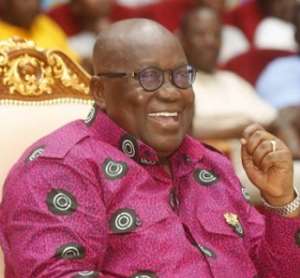
"Like angry spectators criticizing football players during a match, the same way many of us are dissatisfied with the Akufo Addo government, but as mentioned in one of my articles, one of the best ways to find out if the current Ghanaian government is doing well or not is to read other foreign newspapers. The article below about Ghana’s economy under Nana Akufo Addo was written by an Italian writer, Giambattista Pepi. After reading it, I made the translation." Source: https://bit.ly/2X1fCZE
Ghana has undoubtedly gone through a complicated period in recent years, with an economy that has faced a currency crisis, double-digit inflation, very high interest rates and a rising level of public debt.
However, today, Ghana's growth is recovering and the economy has entered a transition phase.
Recently, we have been in the country, experiencing many positive developments. The International Monetary Fund expects GDP growth in Ghana to rise to 8.6% in 2018, well above the 3.4% forecast for the rest of the sub-Saharan region.
Ghana is the second largest economy in West Africa, driven by oil, gold, cocoa and timber exports. The recent increase in prices and oil production are the main drivers for the improvement in the outlook, while the downward trend in inflation has led to a recovery in domestic demand.
Tullow Oil, one of our oil and gas fund positions, was one of the biggest beneficiaries of this context, increasing production on the "TEN fields" site off the Ghanaian coast. The stable political situation also helped improve the outlook for the country.
The Government of President Nana Akufo-Addo, in power since January 2017, has made significant progress towards reducing public spending and reaching budget targets.
A continuing fiscal discipline will be of vital importance for the reversal of Ghana, especially considering its debt / GDP ratio around 70% and the probability that the IMF will conclude its program in the country in December.
The Ghanaian banks have encountered difficulties regarding asset quality, and also the loan portfolio was influenced by lower oil prices and exposure to some public companies in the energy sector that are struggling a lot.
The Bank of Ghana has significantly increased the capital requirements for local institutions, from 125 million Ghana cedi to around 400 million (around 100 million dollars), with the aim of triggering a consolidation of the sector by reducing the number of banks in the country from 34 to around 24.
On the other hand, the expansion of credit in the private sector, controlled year-by-year growth in loans has increased to reach 5%. The two banks we met on our last trip to the country are aiming for a level between 10% and 20% for 2018.
Standard Chartered Ghana has expressed optimism about the prospects for fundamentalism in Ghana and expects that this will lead to higher levels of ROE. This bank has the highest ratio of non-performing loans (NPL) in the industry, at 45% compared to 21% on average, but debt coverage ratios are solid.
More limited is the limited liquidity and the price-to-book ratio (P / B), following a sharp rise in share prices in 2017. EcoBank Ghana has instead shown a more proactive approach to asset quality and has decreased its own NPL ratio, bringing it to 12%.
Improved fundamentals and a strong management team make it an interesting opportunity. In conclusion, we returned from our trip to Ghana with greater optimism about the top-down development of the country's economy.




 We’ll protect state wealth from opaque deals – Prof Jane Naana
We’ll protect state wealth from opaque deals – Prof Jane Naana
 Mauritania president says running for second term in June polls
Mauritania president says running for second term in June polls
 I won't ever say I was a mere driver’s mate' — Prof. Opoku-Agyemang
I won't ever say I was a mere driver’s mate' — Prof. Opoku-Agyemang
 2024 polls: 'EC struggling to defend credibility'— Prof. Opoku-Agyemang
2024 polls: 'EC struggling to defend credibility'— Prof. Opoku-Agyemang
 Akufo-Addo gov't's 'greed, unbridled arrogance, unrestrained impunity, sheer dis...
Akufo-Addo gov't's 'greed, unbridled arrogance, unrestrained impunity, sheer dis...
 Election 2024: Ghana needs an urgent reset, a leadership that is inspiring – Ma...
Election 2024: Ghana needs an urgent reset, a leadership that is inspiring – Ma...
 Partner NDC to rollout a future of limitless prospects – Prof Jane Naana Opoku-A...
Partner NDC to rollout a future of limitless prospects – Prof Jane Naana Opoku-A...
 NPP will remain in gov’t till Jesus comes — Diana Asamoah
NPP will remain in gov’t till Jesus comes — Diana Asamoah
 Sunyani Technical University demands apology from former SRC president over sex-...
Sunyani Technical University demands apology from former SRC president over sex-...
 'Dumsor' was resolved by Mahama but ‘incompetent' Akufo-Addo has destroyed the g...
'Dumsor' was resolved by Mahama but ‘incompetent' Akufo-Addo has destroyed the g...
